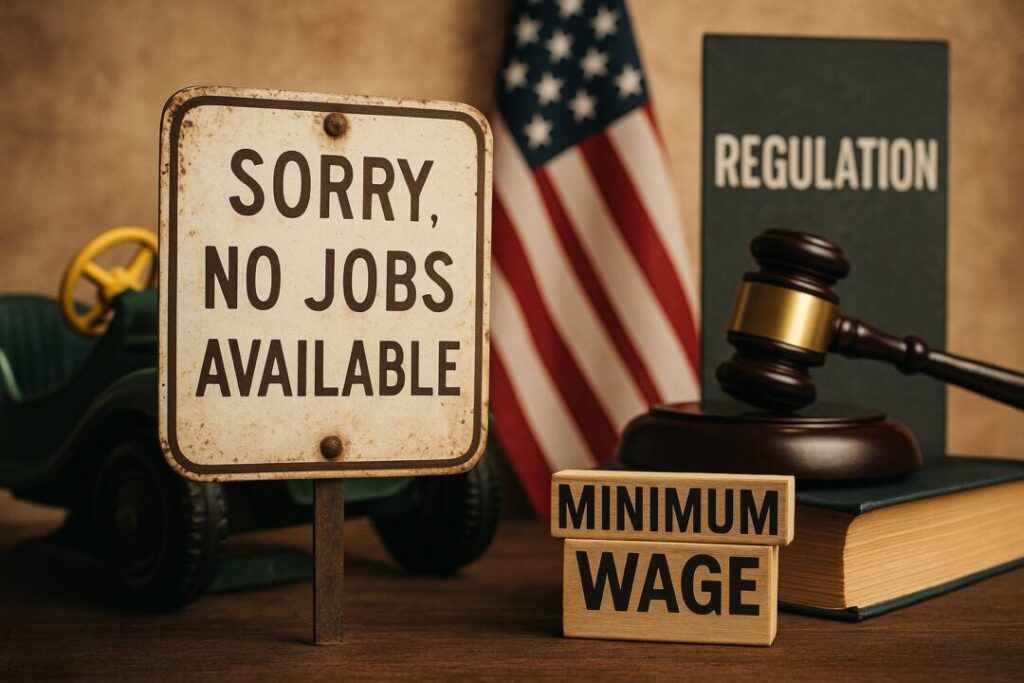For generations, summer jobs gave teens their first taste of adulthood. Flipping burgers. Folding jeans at the mall. Mowing lawns. It was a rite of passage.
But nowadays, fewer teens are working – and it’s not because they’re lazy or glued to their phones.
According to a recent article by the New York Times, only about one in three teens between the ages of 16 and 19 had a job last July. That’s down from more than half back in 2000.
And while critics want to blame everything from COVID to Trump-era trade policies, the real reasons are closer to home: minimum wage hikes and government regulations that have made it harder – and more expensive – for businesses to hire young people.
Nevada Teens Hit Especially Hard
Here in Nevada, the minimum wage just jumped to $12 an hour for all workers – no exceptions, even for students working their first job.
For small businesses already struggling with inflation, that’s a dealbreaker.
Stores used to be able to hire a high school kid to sweep up or stock shelves. Now it costs the same to hire someone with no experience as someone with five years under their belt. It just doesn’t pencil out.
And it’s not just the pay.
Nevada labor laws put strict limits on when and how teens can work. They can’t work during school hours, even if they’re homeschooled.
There are also limits on how late they can work on school nights, plus piles of paperwork and liability concerns.
For many employers, the headache just isn’t worth it.
Too Much Regulation, Not Enough Opportunity
Nationwide, the teenage workforce has been shrinking for decades, but economists say state-level policies are making it worse.
In states with higher minimum wages, like Nevada, California, and Washington, teen employment is much lower than in states with lower wage floors.
A 2021 study by the Congressional Budget Office found that raising the federal minimum wage to $15 could lead to 1.4 million lost jobs, many of them for low-skill or entry-level workers – including teens.
The irony?
These laws were meant to help workers earn more. But for teens trying to get that all-important first job, the result has been the opposite: fewer chances to gain experience, build work habits, or save for college.
“Kids aren’t learning how to work anymore,” said a longtime Nevada restaurateur. “And when they turn 20 or 21 and try to get a job, they’re behind the curve because they never had that first part-time gig at 16.”
Don’t Blame Trump or Tourism
Some on the left have tried to blame former President Donald Trump, saying his tariffs scared off international tourists and hurt Nevada’s hospitality industry.
But that argument doesn’t hold water.
The truth is, tourism in Las Vegas rebounded quickly after the pandemic and the “Sisolak Shutdown.” According to the Las Vegas Convention and Visitors Authority, more than 40 million people visited Southern Nevada in 2023 – almost back to pre-COVID levels.
What’s keeping employers from hiring teens isn’t a lack of customers. It’s the cost and complexity of doing so.
Progressive groups argue that teens shouldn’t be paid less just because they’re younger. They say higher wages help reduce poverty and give young people more dignity in the workplace.
But that only works if they’re hired in the first place!
“If companies are going to have to start paying more, they’re going to start hiring less people,” said Nicholas Kellogg, an 18‑year‑old working at PacSun in Missouri.
A Path Forward
If Nevada wants to get teens back to work, lawmakers need to take a hard look at what’s standing in the way. That means revisiting minimum wage mandates for youth workers and cutting the red tape around teen employment.
Summer jobs aren’t just about money. They’re about learning responsibility, showing up on time, dealing with customers, and building confidence.
In a state where work ethic helped build the Strip from sand to skyline, it’s time we made it easier – not harder – for the next generation to learn how to work.
This article was written with the assistance of AI. Please verify information and consult additional sources as needed.




